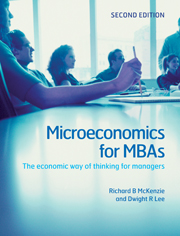Book contents
- Frontmatter
- Contents
- Preface
- How to use this book
- List of online perspectives
- List of further readings online
- List of online video modules
- Book I The market economy, overview and application
- 1 Microeconomics: a way of thinking about business
- 2 Principles of rational behavior in society and business
- 3 Competitive product markets and firm decisions
- 4 Applications of the economic way of thinking: domestic government and management policies
- 5 Applications of the economic way of thinking: international and environmental economics
- Book II Demand and production theory
- Book III Competitive and monopoly market structures
- References
- Index
3 - Competitive product markets and firm decisions
from Book I - The market economy, overview and application
- Frontmatter
- Contents
- Preface
- How to use this book
- List of online perspectives
- List of further readings online
- List of online video modules
- Book I The market economy, overview and application
- 1 Microeconomics: a way of thinking about business
- 2 Principles of rational behavior in society and business
- 3 Competitive product markets and firm decisions
- 4 Applications of the economic way of thinking: domestic government and management policies
- 5 Applications of the economic way of thinking: international and environmental economics
- Book II Demand and production theory
- Book III Competitive and monopoly market structures
- References
- Index
Summary
Competition, if not prevented, tends to bring about a state of affairs in which: first, everything will be produced which somebody knows how to produce and which he can sell profitably at a price at which buyers will prefer it to the available alternatives; second, everything that is produced is produced by persons who can do so at least as cheaply as anybody else who in fact is not producing it; and third, that everything will be sold at prices lower than, or at least as low as, those at which it could be sold by anybody who in fact does not do so.
Friedrich A. HayekIn the heart of New York City, Fred Lieberman's small grocery is dwarfed by the tall buildings that surround it. Yet it is remarkable for what it accomplishes. Lieberman's carries thousands of items, most of which are not produced locally, and some of which come from other parts of this country or the world, thousands of miles away. A man of modest means, with little knowledge of production processes, Fred Lieberman has nevertheless been able to stock his store with many if not most of the foods and toiletries his customers need and want. Occasionally Lieberman's runs out of certain items, but most of the time the stock is ample. Its supply is so dependable that customers tend to take it for granted, forgetting that Lieberman's is one small strand in an extremely complex economic network.
- Type
- Chapter
- Information
- Microeconomics for MBAsThe Economic Way of Thinking for Managers, pp. 80 - 126Publisher: Cambridge University PressPrint publication year: 2010



